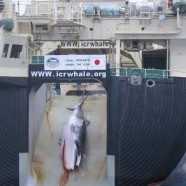Poincaré v. Montaigne
Information note n° 5
Whales at the International Court of Justice
The Hague, The Netherlands, 1st hearing of Japan July 2nd – July 4th
From June 26-28, Australia’s first round of hearings, issues on the purpose of scientific research and on the rationale of hypothesising were raised by the Court. The “positive” contribution to science of JARPA II was put into question. The objectives of the JARPA II program are considered by Australia to be the equivalent of “examining only the European red squirrel to understand what is happening to the European ecosystem” and science which is not built on solid ground. For memory, one of the objectives of JARPA II is to better understand biological parameters in the Antarctic ecosystem (see Information note N°1 for information on Japan’s JARPA objectives). Australia quoted Henri Poincaré, the French Professor, who wrote in 1905 that “science is built up of facts, as a house is built of stones; but an accumulation of facts is no more science than a heap of stones a house”. According to Australia, Japan’s collection of dead whales is not contributing to the stepping stones of scientific progress but a simple proliferation of useless stones.
Japanese “Scientific Whaling” by its Right Name is “Commercial Whaling”
Information note n°3
Whales at the International Court of Justice
The Hague, The Netherlands, 1st hearing of Australia, June 26th – June 28th
In his opening statement for Australia, Mr Campbell projected an image of a Japanese vessel with “Legal Research under the ICRW”* painted on the side and yet another whale lying dead on the slipway. For Australia, this is the image and language of a country trying to convince itself that they are contributing to science and thereby respecting the law. The international community and more specifically the international scientific community is not convinced.
Japanese “Scientific Whaling” by its Right Name is “Commercial Whaling”
Information note N°3
Whales at the International Court of Justice
The Hague, The Netherlands, 1st hearing of Australia, June 26th – June 28th
In his opening statement for Australia, Mr Campbell projected an image of a Japanese vessel with “Legal Research under the ICRW”* painted on the side and yet another whale lying dead on the slipway. For Australia, this is the image and language of a country trying to convince itself that they are contributing to science and thereby respecting the law. The international community and more specifically the international scientific community is not convinced.
The End of the Japanese Fairy Tale
Information note n°2
Whales at the International Court of Justice
The Hague, The Netherlands, 1st hearing of Australia, June 26th – June 28th
Impressions on the Australian point of view during the hearings from June 26th 27th and 28th 2013
During the first three days of the Australia v. Japan court case at the International Court of Justice, Australia has been presenting arguments stating them loud and clear to wake Japan up from over twenty years’ of sleep. Japan, indeed, had fallen into a deep legal sleep like a “Sleeping Beauty”, and the international community should not wait until a “beautiful white whale” comes along to wake them up. Such was the metaphor used by Mme Boisson De Chazournes when she presented the court with Japan’s interpretation on the wording of the text of the International Whaling Commission (IWC). She stated that contrary to Japan’s reading of the 1946 IWC, the Convention enforces whale conservation and does not provide for the reinforcement of commercial whaling. As to the breaching of international law, and the continuation of whaling by Japan, Australia’s arguments are threefold. Firstly, the use of whale catchers and factory ships, secondly, a clear breaching of the 1986 moratorium on commercial whaling and thirdly, a violation of the Southern Ocean Sanctuary specifically with regard to fin whale catches.
The End of the Japanese Fairy Tale
Information note N°2
Whales at the International Court of Justice
The Hague, The Netherlands, 1st hearing of Australia, June 26th – June 28th
Impressions on the Australian point of view during the hearings from June 26th 27th and 28th 2013
During the first three days of the Australia v. Japan court case at the International Court of Justice, Australia has been presenting arguments stating them loud and clear to wake Japan up from over twenty years’ of sleep. Japan, indeed, had fallen into a deep legal sleep like a “Sleeping Beauty”, and the international community should not wait until a “beautiful white whale” comes along to wake them up. Such was the metaphor used by Mme Boisson De Chazournes when she presented the court with Japan’s interpretation on the wording of the text of the International Whaling Commission (IWC). She stated that contrary to Japan’s reading of the 1946 IWC, the Convention enforces whale conservation and does not provide for the reinforcement of commercial whaling. As to the breaching of international law, and the continuation of whaling by Japan, Australia’s arguments are threefold. Firstly, the use of whale catchers and factory ships, secondly, a clear breaching of the 1986 moratorium on commercial whaling and thirdly, a violation of the Southern Ocean Sanctuary specifically with regard to fin whale catches.









